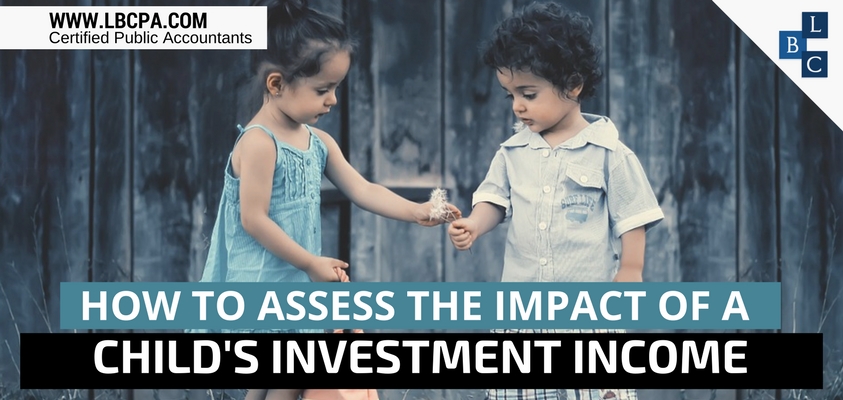LBCPA News 
Click here to go back
- HOW TO ASSESS THE IMPACT OF A CHILD'S INVESTMENT INCOME

When they’re old enough to understand the concepts, some children start investing in the markets. If you’re helping a child learn the risks and benefits of investments, be sure you learn about the tax impact first.
Potential danger
For the 2016 tax year, if a child’s interest, dividends and other unearned income total more than $2,100, part of that income is taxed based on the parent’s tax rate. This is a critical point because, as joint filers, many married couples’ tax rate is much higher than the rate at which the child would be taxed.
Generally, a child’s $1,050 standard deduction for unearned income eliminates liability on the first half of that $2,100. Then, unearned income between $1,050 and $2,100 is taxed at the child’s lower rate.
But it’s here that potential danger sets in. A child’s unearned income exceeding $2,100 may be taxed at the parent’s higher tax rate if the child is under age 19 or a full-time student age 19–23, but not if the child is over age 17 and has earned income exceeding half of his support. (Other stipulations may apply.)
Simplified approach
In many cases, parents take a simplified approach to their child’s investment income. They choose to include their son’s or daughter’s investment income on their own return rather than have him or her file a return of their own.
Basically, if a child’s interest and dividend income (including capital gains distributions) total more than $1,500 and less than $10,500, parents may make this election. But a variety of other requirements apply. For example, the unearned income in question must come from only interest and dividends.
Many lessons
Investing can teach kids about the time value of money, the importance of patience, and the rise and fall of business success. But it can also deliver a harsh lesson to parents who aren’t fully prepared for the tax impact. We can help you determine how your child’s investment activities apply to your specific situation.
If you have any questions regarding accounting, domestic taxation, international taxation, IRS representation, U.S. tax implications of Real Estate transactions or financial statements, please give us a call at 305-274-5811.
Source: IRS






